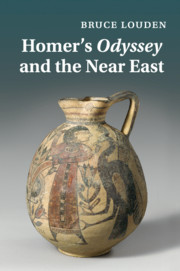Book contents
- Frontmatter
- Contents
- Acknowledgements
- Introduction
- 1 Divine councils and apocalyptic myth
- 2 Theoxeny
- 3 Romance
- 4 Odyssey 4
- 5 Odyssey 5
- 6 Odyssey 6–8, 10–12, 13.1–187; Genesis 28–33; Argonautic myth
- 7 Odysseus and Jonah
- 8 The combat myth
- 9 Catabasis, consultation, and the vision
- 10 Thrinakia and Exodus 32: Odysseus and Moses
- 11 The suitors and the depiction of impious men in wisdom literature
- 12 Odysseus and Jesus
- 13 Contained apocalypse
- Conclusion
- Bibliography
- Index locorum
- Subject index
1 - Divine councils and apocalyptic myth
Published online by Cambridge University Press: 04 February 2011
- Frontmatter
- Contents
- Acknowledgements
- Introduction
- 1 Divine councils and apocalyptic myth
- 2 Theoxeny
- 3 Romance
- 4 Odyssey 4
- 5 Odyssey 5
- 6 Odyssey 6–8, 10–12, 13.1–187; Genesis 28–33; Argonautic myth
- 7 Odysseus and Jonah
- 8 The combat myth
- 9 Catabasis, consultation, and the vision
- 10 Thrinakia and Exodus 32: Odysseus and Moses
- 11 The suitors and the depiction of impious men in wisdom literature
- 12 Odysseus and Jesus
- 13 Contained apocalypse
- Conclusion
- Bibliography
- Index locorum
- Subject index
Summary
After a short proem (Od. 1.1–10), and brief transition, the Odyssey's first scene is a divine council on Mount Olympos (Od. 1.26–96). I define a divine council simply as a conversation between two or more gods, often a large assembly of them, usually with the chief god presiding, usually concerned with the myth's protagonist. Since they depend on the presence of more than one god, divine councils are a naturally polytheistic genre, and also occur outside of epic. They are often considered a type-scene, but I here treat them as a genre of myth because in the Odyssey they trigger, manage, or conclude, larger blocks of narrative. Since divine councils come in only a few basic types, a typology of the specific subtypes is useful. Having determined which subtype a given divine council belongs to, we can then place it in a larger context of similar scenes, each of which helps demonstrate how instances of that subtype typically function. Our context for analyzing the Odyssey's divine councils will be the divine councils in Gilgamesh, the Ugaritic myths, the Iliad, Hesiod, and Old Testament myth.
In most Greek or Near Eastern heroic myths three gods typically define the parameters of a hero's career. The three gods are each associated with a specific type-scene through which they demonstrate and act out their specific relationship with the hero.
- Type
- Chapter
- Information
- Homer's Odyssey and the Near East , pp. 16 - 29Publisher: Cambridge University PressPrint publication year: 2011



